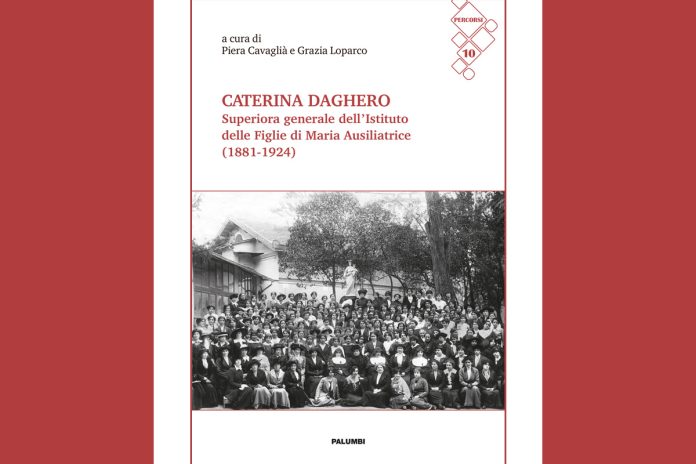Rome (Italy). The volume has been published: Caterina Daghero, Superior General of the Institute of the Daughters of Mary Help of Christians (1881-1924), edited by Piera Cavaglià and Grazia Loparco (FMA Institute FMA – Studies Center, series Percorsi no. 10, 272 p.), edited by Palumbi Publishers, Teramo 2024.
The volume contains the proceedings of two the conferences held at Nizza Monferrato and at Roma in on the occasion of the centenary of her death, while two volumes of her letters are already being printed.
The Studies are an opportunity to discover a figure who is little known so far, yet of prime importance in consolidating the spirit of the Institute, in fidelity to Don Bosco and Mother Mazzarello, by implementing their educative passion in the face of new needs of young women to prepare for life, in increasingly diverse contexts.
The contributions of Piera Cavaglià, Ana María Fernández, Giulia Galeotti, Grazia Loparco, Francesco Motto, Maria Concetta Ventura, illuminate different aspects of the personality and government of Mother Caterina, first successor of Saint Mary Domenica Mazzarello.
In 43 years of government, Mother was called to face critical moments and at the same time to lead a rapid development of the Provinces. Moved by the momentum of the Da mihi animas incarnated in the origins of Mornese, she felt responsible for preserving intact the heritage of a vocation to holiness woven into active and joyful educative commitment and, at the same time, developing it in a constant process of local adaptation, always starting from personal attitudes appropriate to the mission.
This made her maternal, strong, and understanding together, attentive to indicate to the Sisters the great horizon of meaning, to face the difficulties of each day for love of the One Who sends to an urgent and passionate mission.
One of her main criteria for governing was, “We must see with our own eyes, touch with our own hands.” And indeed, without regard to the sacrifices, she went to meet the Sisters, near and far, to share in a family spirit their life, the real conditions of the young women and families, the prospects for development, so varied according to the contexts. Without deluding herself with the flourishing statistics, as a Superior she wondered if in so much hard work, the spirit of the Institute really cultivated (later called Charism), by remaining attached to the roots.
Her experience and the criteria expressed in letters as well as in concrete choices, shared with the Councilors, offer a genuinely Salesian light for the spiritual life, for the style of educative communities that bear the Salesian imprint, to renew active and creative courage in front of the needs of youth, always remaining open to new appeals and to respond with the energy of educative, preventive, and liberating love, in view of a human fullness.
As Superior General of a great Institute soon opened to foreign missions, the government of Mother Daghero constitutes an interesting case in the Church and in the history of women, which deserves to be examined in depth because of the importance of women’s religious life between the Ninth and the twentieth century, with its unprecedented contribution to the apostolate during the time of secularization.
In her presentation, Mother Chiara Cazzuola writes, “Mother Caterina Daghero is a hundred percent Salesian, faithful to Don Bosco, to the Da mihi animas cetera tolle, committed to promoting the assimilation of the spirit of the Founder in the FMA communities, even those more distant. She takes the initiative to welcome for the FMA the direction of new educative works or those responding to particular historical conjunctures, natural disasters, and the new educative needs of the time.”
She concludes by wishing to accept the invitation of Mother Catherine Daghero, still current today, “To work! We must always be at the forefront of charity!”.




















